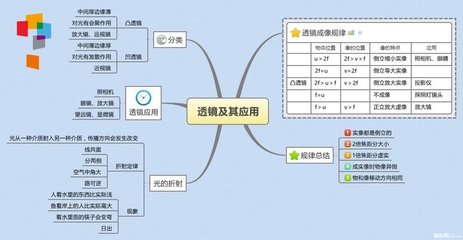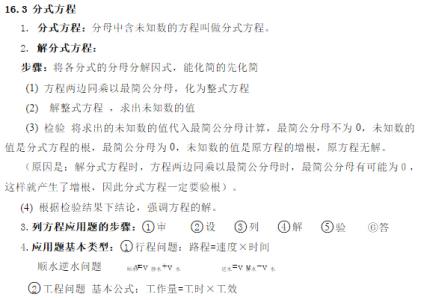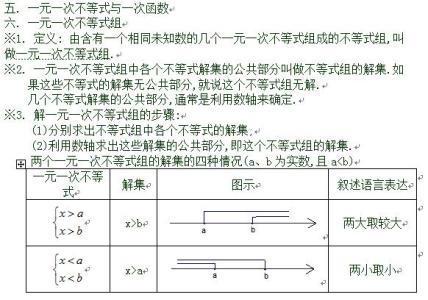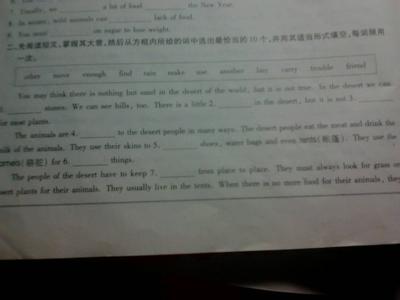在学习英语的过程中,我们要懂得把握重点知识。下面是小编为大家收集整理初二英语下册知识点,相信这些文字对你会有所帮助的。
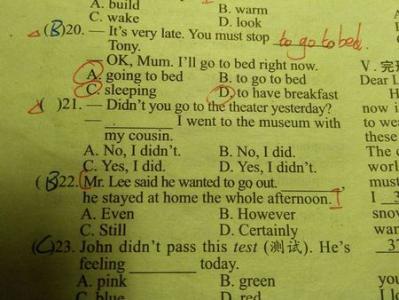
初二英语下册知识点(一)
Will people have robots?
重点语法:一般将来时态的应用
do/does 的一般将来时态形式:(shall/will) do
do/does 的一般将来时态的被动语态:(shall/will) be done
一般将来时态的肯定句、否定句、疑问句形式:
肯定句例句:People will have robots in a few years.
否定句例句:People (will not/won't) have robots in a few years.
一般疑问句例句:Will people have robots in a few years?
特殊疑问句例句:What will people have in a few years?
重点短语:won't = will not
they'll = they will
she'll = she will
he'll = he will
I'll = I will
fall in love with(sb./sth.) 爱上(某人/某物)
be able to do sth. 能够做某事
come true 实现
in the future 未来
hundreds of 数以百计的
thousands of 数以千计的
look for(sb./sth.) 寻找(某人/某物)
will → would 情态动词 will 的原形和过去式
may → might 情态动词 may 的原形和过去式
Reading Strategy(阅读方法)
Look at the title and picture, and predict what you will read about. (看着标题和图片,预知你要阅读那些方面的内容。)This helps you get ready to acquire new information. (这样可以帮助你获得一些新的信息。)
初二英语下册知识点(二)What should I do?
重点语法:过去将来时态(将来时态的委婉说法)
do/does 的过去将来时态形式:(should/would) do
do/does 的过去将来时态的被动语态:(should/would) be done
过去将来时态的肯定句、否定句、疑问句形式:
肯定句例句:You should write a letter to him.
否定句例句:You shouldn't write a letter to him.
一般疑问句例句:Should I write a letter to him?
特殊疑问句例句:What should I do?
重点短语:keep sb. out 不让某人进入
What's wrong? = What's the matter? = What's the problem? 怎么了?
out of style 不时髦的;过时的
call sb. up 给某人打电话
pay for sth. 为某事付款
part-time job 兼职工作
the same as = be same (to/with) 与……同样
in style 时髦的;流行的
get on [well] with sb. = get along [well] with sb. 与某人相处(好)
didn't = did not
couldn't = could not
as … as possible 尽可能……(eg/ as soon as possible 尽快)
all kinds of 各种;许多
on the one hand 一方面
on the other hand 另一方面
ask sb. for sth. = ask sb. to do sth. 请求某人做某事
ask sb. not to do sth. 请求某人不要做某事
spend (money) on sth. = spend (money) [in] doing sth. 花钱做某事
sth. cost sb. (money) 某人花钱为了某事
take sb. sometime to do sth. 花某人时间做某事
find out 查明
find sb. doing sth. 发现某人做某事
be angry with sb. 生某人的气
be angry at sth. 生某事的气
the same age as = as old as 与某人年龄一样
have fight with sb. 与某人打架
learn to do sth. 学会做某事
not … until … 直到……才……
compare sth.(A) with sth.(B) 把某事(A)与某事(B)作比较
it's time for sth. = it's time to do sth. 到该做某事的时间了
maybe adv. 或许
may be (情态动词 + 动词原形)可能是
shall → should 情态动词 shall 的原形和过去式
pay → paid → paid 动词 pay 的原形、过去式和过去分词
Reading Strategy(阅读方法)
You will learn to use new words better if you use a learner's dictionary. (时刻学着应用新单词来学习比时刻使用字典这种途径方法更好。)A bilingual dictionary sometimes gives the wrong meaning for the situation you want. (在某些你需要的场合下,一本双语字典有时会给你错误的解释。)
 爱华网
爱华网